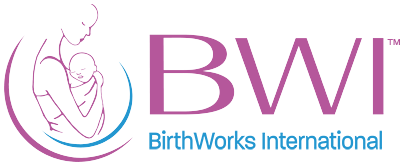People come to BirthWorks for our Philosophy that frames birth with trust in mothers and in babies as both competent and capable. We also work continuously to provide evidence-based research to our parents, members, and students. Recent news has brought some disturbing health trends to light, including highly concerning data on childbirth in the US. It is disturbing that these trends show a rise in harm, with certain groups being more negatively impacted than others. We want to share this news with you, and also offer reflections on ways to improve outcomes and honor needs—to move toward the best health and wellness for all mothers, babies, and families.
[Note: Although the focus here is on US childbirth, there is relevance for other countries too.]
In August 2025, ScienceNews published an article titled: Many U.S. babies may lack gut bacteria that train their immune systems. The article’s author, Tina Hesman Saey, shared the following:
- “About three-quarters of babies born in the United States may not have enough friendly microbes in their guts to protect against developing allergies, asthma, and eczema. In a study of over 400 babies, about 76% had low levels of Bifidobacterium, gut microbes that digest sugars in breast milk… That includes 24 percent with no detectable microbes.”
- “Children born by C-section were more likely to have low or missing levels of Bifidobacterium… And breastfeeding didn't restore the bacteria in these babies. Instead, the lack of Bifidobacterium allowed some potentially harmful bacteria to thrive.”
This can be summarized concisely: 75% of US babies are more likely to suffer unnecessary illness, with an impact on their childhood health for years—and often through their lifetimes. Many babies lack the proper gut bacteria to digest sugars in breastmilk, thereby harming their gut health and interrupting the development of their immune system. The overuse of cesarean sections adversely affects the health of infants into adulthood—as well as future generations. These alarming (and accelerating) trends lead to bad health outcomes for babies both now and over time.
| Healthcare choices in the short- and long-term matter TO BABIES! Gut (or microbiome) health is key to overall health—if a baby is missing certain gut bacteria, there is a 3x higher risk they will develop childhood illnesses in the first two years of life. Unnecessary cesareans, coupled with a lack of breastfeeding, harms babies. Alternatively, vaginal birth and breastmilk components support healthy human organ and tissue development—think brain, heart, and immune system—for long-term protection and resilience. Epigenetic and immunological research highlight essential immunity benefits for fighting non-communicable diseases. For example, distinct breastmilk molecules kill cancer cells and reduce pain, and stem cells in breastmilk can help babies heal and fight infection. |
Harm to babies is not the only problem!
Often, modern health care is so focused on the birth and the baby that mothers may be forgotten, neglected, harmed, or worse. In September 2025, The Week published an article titled: Pregnancy in America: Why is it getting riskier to give birth in the US? The article discussed the rising dangers and costs of giving birth in the US (especially in a hospital). A UNC professor was quoted as saying, “We are so baby-focused. Once the baby is here, it’s almost like the mother is discarded.”
This article highlights the following:
- “The U.S. has a higher rate of mothers dying in pregnancy, childbirth, and postpartum than any other high-income nation, with 32.6 deaths for every 100,000 live births in 2022, up from 25.3 deaths in 2018. The rates are sharply higher for some ethnic groups: Black women had a mortality rate of 50 deaths per 100,000 live births in 2022, nearly triple the rate for white and Hispanic women.”
- “The average cost of giving birth is also higher in the U.S. than in other high-income countries, coming in at nearly $19,000 for a vaginal delivery in 2022, or about $2,854 after insurance kicks in.”
- “Cesarean deliveries are also becoming more common, going from about 1 in 5 births in 1996 to 1 in 3 today, and surgery comes with risks.”
- “Most of the women don’t die in the hospital during childbirth…They die after they’ve left the hospital… About 22% of deaths occur during pregnancy, 25% within seven days of giving birth, and 53% occur between seven days to a year postpartum, according to a 2022 report from the Centers for Disease Control.”
A reduction in unnecessary cesarean deliveries does not seem to be likely in the near future, and these other disturbing trends are not expected to stop. In fact, as the article goes on to say, lack of access to prenatal and postpartum care will worsen given Medicaid cuts, which cover over 40% of US births. Imposing work requirements (or a difficult process for exemption) means many families will lose insurance. Also, resource loss for rural hospitals (especially for costly maternity care) means reduced service access or closing delivery units—and even longer distances to hospital for people who sometimes already need to drive hours for access. Abortion restrictions and bans, too, the article goes on to say, mean healthcare providers may deny care for emergency health care related to, for example, birth complications, which is not just. Other government programs are being developed to try to meet some needs—such as extending the postpartum coverage period—but success will be limited if they cannot cover the funds lost, nor provide more deeply needed care.
What are some answers?
Truth-telling about birth trauma is needed now. In this modern day of medicalized birth, many birthing mothers go into birth expecting a positive experience but end up experiencing birth trauma. Changing the disturbing trends in birth includes getting real about mother and infant physical and emotional harm, injury, and mortality.
The true cost of highly medicalised birth needs to be understood. Medical procedures and surgeries all have risks that can occur during or after treatment, whether intended or unintended. The costs of these risks range from physical and emotional health to expenses families must pay out of pocket if they don't have insurance coverage.
Health infrastructure investment needs to center on access to all—especially minority groups, low-income families, and those in rural areas. The groups harmed most by current trends need their voices heard so their providers understand the context of challenge and possibility—so there can be change.
Childbirth medical and health care must focus first on mothers’ true needs! Most mothers are low-risk birthers whose needs are best met with limited or no medical intervention. (For example, not all women of higher reproductive age (who have children later in life) should be automatically boxed into the high-risk category.) When the true needs of each birther are met, the best technological intervention and expert care are available as a priority for true high-risk mothers.
Now is the time to stop causing unvalidated fear in pregnant mothers. Pregnant mothers need to believe that birth is a natural, normal event that does not require intervention in most cases. In today’s world, however, fear and uncertainty are often instilled into pregnant women by caregivers and social media. Sadly, fear carried from pre-conception and pregnancy increases stress hormones and creates doubt, which can then cause delays in labor and result in the increased use of medical procedures. This ‘intervention-heavy’ path to birth is often harmful and can lead to trauma and a stressful memory of birth.
Birthing parents must understand that a cesarean is more than just another intervention. In reality, a cesarean is major surgery and carries major risks that have many harmful health and wellness impacts for both mother and baby—both short and long term! Factual education about the risks of cesarean surgery to mothers and babies can help ensure that birthing families fully understand their right of informed consent (and that they know they can use it every step of the way to choose the best, most just birth).
Babies, as much as possible, should receive only human milk. Babies’ guts are one of the first microbiomes—and gut health impacts normal brain and immune system development, including the essential work of differentiating between helpful or harmful bacteria. The process of seeding the newborn’s microbiome continues on for the duration of breastfeeding, helping newly developing immune cells to fight infection and training the immune system for long-term health.
We can trust human milk science, which shows that breastmilk is the best choice for babies. Know that mothers each produce a unique fingerprint of sugars in their milk specific to their baby’s needs—sugars used only to feed the baby’s microbiome and strengthen their immune system. Among its many benefits, the anti-bacterial and anti-viral effects of breastmilk inhibit cancer cell growth and many infections, and bind with iron in the gut so that harmful microorganisms cannot use it to survive.
Prioritizing breastfeeding education and preparation during pregnancy, as well as professional lactation support for mothers in the earliest hours and days after birth, is key! Breastfeeding support is so important, especially if there are or were challenges to establishing breastfeeding. Better access to human milk banks, and more resources to develop them and best match donor milk to babies—especially the most vulnerable ones—is also key to success.
Understanding that gut health impacts key development and lifetime health can be empowering.
- How we are born and if we are breastfed truly matter
- The overuse of antibiotics and antibacterial products matters
- Habits related to diet can either harm (e.g., eating too many processed foods and too few fermented foods) or heal (e.g., eating organic vegetables and fruits, whole grains, and fiber)
- Healthy eating can help with chronic medical conditions, including obesity and cardiovascular disease, which also increase risk in pregnancy.
Postpartum care and support are essential! Expectant parents would greatly benefit from hiring a birth doula and a postpartum doula—both to help reduce stress and avoid potential risks. Knowing that over 75% of childbirth-related deaths happen after birth, and that approximately 80% of those are preventable, shows that we are clearly failing at supporting new families in the postpartum period. The real challenges include maternal mental health and related health issues (often severe), postpartum bleeding, and heart issues… among other challenges that often overlook the harm and trauma that result from unnecessary interventions.
These recent articles, published in ScienceNews and The Week, highlight some increasing challenges and disturbing trends in modern birth. And while the findings they share are alarming, they are also, perhaps, a further call to action for those who are invested in the future of humanity and in the well-being of the mothers, babies and families who deserve more. Will you join us as we continue to strive for improved outcomes in birth, and for ways to move toward the best health and wellness for all?
| Parents and all childbirth stakeholders can help PREVENT HARM AND ENHANCE LIFETIME HEALTH FOR BABIES AND MOTHERS STARTING NOW! Early childbirth preparation (online or with a local educator) helps parents understand the facts and the importance of their choices—provider, birth place, limiting interventions—and informed consent. Birth Doulas help parents advocate, reduce fear, and shorten labor. Also, breastfeeding education is key to success. Good lactation professionals and Newborn Care Specialists (Kangaroulas) can help parents meet their baby’s ideal needs, and Postpartum Doulas provide especially significant care and support to ensure mothers’ wellness. |
Resources
Pregnancy in America: Why is it getting riskier to give birth in the US? (2025). The Week, September 2025. https://theweek.com/politics/pregnancy-america-risks-maternal-health
Saey, T. H. (2025). Many U.S. babies may lack gut bacteria that train their immune systems. ScienceNews, August 2025. https://www.sciencenews.org/article/babies-gut-bacteria-allergies-asthma



